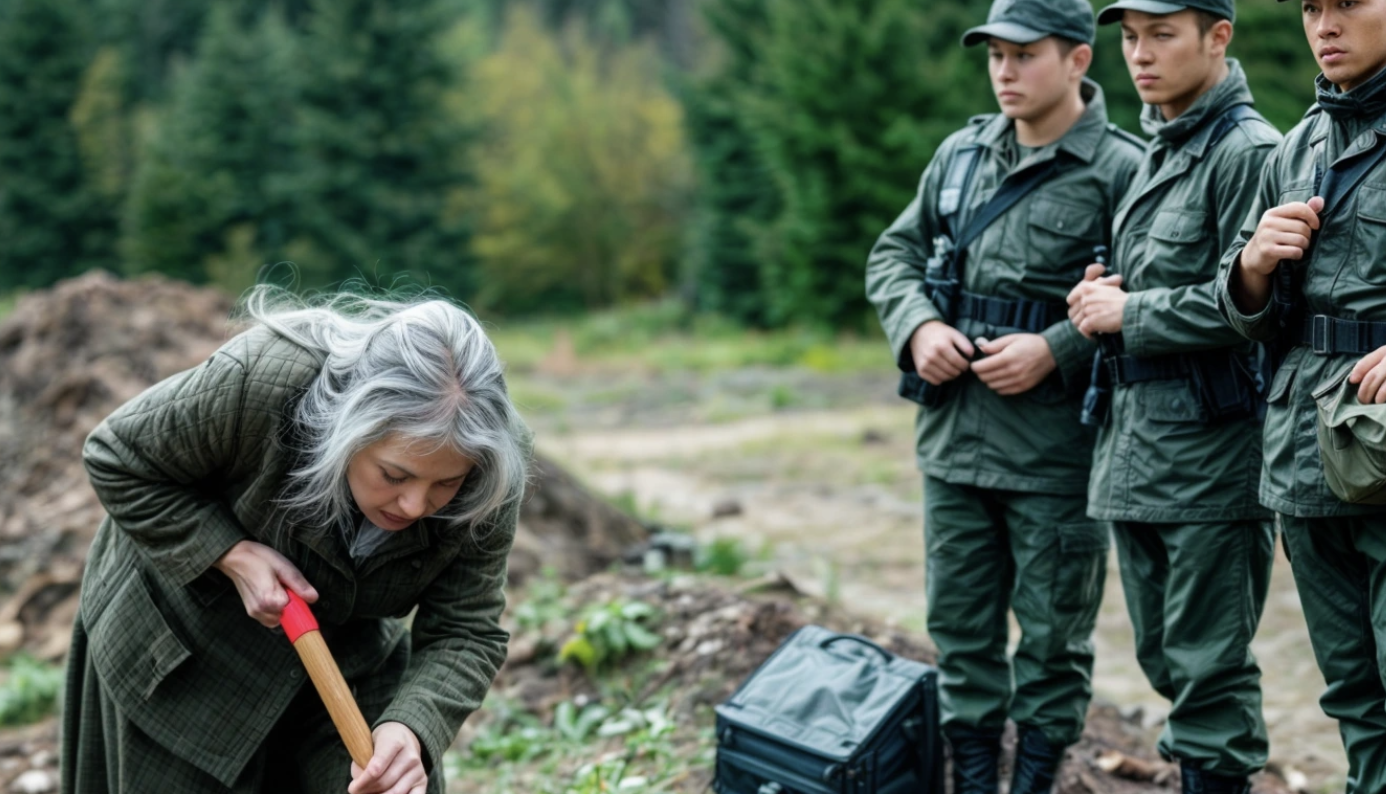Somewhere on the outskirts of an endless backcountry, in a quiet town as if erased from time, lost among gray streets and old lindens, a drama unfolded that stopped the heart of an entire region. This town, nestled in the shadow of an ancient cemetery with its crooked crosses and faded tombstones, became a witness to events that words could not simply describe. This was not just a story — it was an explosion of pain, love, madness, and ultimately, a miracle that made the whole world ponder: what does it mean to be a mother? What is truth? And can love overcome even death?
The night, thick and silent like black velvet, covered the cemetery. The air was heavy, soaked with the smell of decayed leaves and damp earth. In the distance, rare house lights flickered, but here, among the graves, reigned silence, broken only by the creak of shovels and the heavy breathing of two men engaged in a difficult, almost blasphemous labor. They dug. Dug beneath the forbidden sky, under the gaze of the moon, as if it averted its eyes from what was happening. Their hands trembled, their backs bent under the weight not only of the earth but also of fear — for they were breaking the law, invading the sacred space of death. But they did not know that this night would change everything. They could not imagine that beneath the layer of clay and roots lay not just ashes, but a truth capable of destroying lies built on dozens of official papers and false reports.
At the edge of the opened grave, like a statue of sorrow, sat a woman. Her face, carved with wrinkles of time and suffering, was pale, but her eyes — sharper than a knife — pierced through the darkness. There was no madness in them, as the diggers thought — there burned a fire that no cold or time could extinguish. Her name was Nadezhda. Yes, Nadezhda — a name that now sounded like a prophecy. She sat motionless, fingers interlocked as if in prayer, but in fact commanding. Her voice, hoarse from sleepless nights and screams into pillows, sounded clearly:
— Dig. Deeper. To the very bottom.
The men exchanged glances. One muttered:
— Woman, you do realize this is madness?
But she only smiled — bitterly, with contempt for their fears.
— Madness is to remain silent when your heart screams. But I can no longer be silent.
Nadezhda — not just a name, it was her essence. Her whole life she pushed through storms. At forty, when her husband, with whom she had spent twenty years, left her for a young teacher, she did not break. She did not become a victim, did not cry on the doorstep. On the contrary — in the darkest moment of her life, he appeared — Sasha, a young agronomist with burning eyes and a kind soul. It was not passion but a miracle. Despite her age, despite the neighbors’ judgments, the whispers behind her back, she decided to have a child. The pregnancy was risky, doctors shook their heads, but Nadezhda pushed forward like a tank. And then Vlad was born — a boy with clear eyes and a heart full of light.
He grew not just smart — he was a prodigy. Winning math and physics olympiads, reading classics in the original, writing poems that moved to tears. But he was not a bore — on the contrary, he was the life of the party, captain of the school football team, the one who lifted the team after defeat with a single shout: “We’re not done yet!” Nadezhda looked at him and felt: this was not just a son. This was her meaning. Her victory over loneliness, over pain, over fate that tried to break her.
But one day, in eleventh grade, Vlad announced:
— Mom, I’m joining the army.
The word «no» froze in her throat. She tried to talk about risks, that he could enter university, that he had a future. But he looked at her with such firmness that she understood: this was not a whim. This was his path.
The farewell was warm, full of promises and smiles. But as soon as the bus disappeared around the corner, a shadow crept into Nadezhda’s heart. The phone was silent. No calls, no messages. The military office assured: “Everything is fine, the soldier is serving, healthy.” But the mother felt — something was wrong. Very wrong.
And then, three months later, there was a knock at the door. They came in uniform. They brought an envelope.
— We regret, Nadezhda Petrovna. Your son has died. Heart attack.
She fell to her knees. The world collapsed.
But later, when processing documents, she saw: cause of death — pneumonia.
Heart? Pneumonia?
Who lies?
Why?
This discrepancy became her alarm signal. Something was off. Days turned into a nightmare. Nights — into sleeplessness pierced by visions. She began to dig herself — calling, demanding, begging, threatening. But every time she received the same reply: “Case closed. Buried with honors.”
Then she made a decision that chilled the blood in her veins.
— I will open the grave.
— You’re insane! — they shouted at her.
— No, — she answered. — I am a mother. And I have the right to know where my son is.
And so — night. Cemetery. Grave number 47. Shovels. Sweat mixed with tears. The earth seemed to resist. And finally — the coffin.
When they opened it, everyone froze.
The coffin was empty.
Empty.
As if the body had never been placed there.
Nadezhda screamed — not in pain, but in rage. The rage of a mother whose heart was torn apart by lies. She called the police, shouting into the phone:
— My son did not die! He was deceived! He was hidden!
An investigation began. And soon the horrifying truth surfaced: Vlad was indeed caught in a shelling, but did not die — he was wounded, shell-shocked, lost consciousness and… was listed as “missing in action.” Instead of searching, the commanders closed the case, falsified documents, declared him dead. Why? To avoid accountability. To keep the noise down.
Officials were fired. Some — arrested. But that did not bring Nadezhda her son. Only emptiness and new pain.
Months dragged on like eternity. She lived in waiting, as if holding an invisible thread that tied her to Vlad. Every day she looked out the window, every evening set his favorite meal on the table as if he could come in any minute.
And one day — he came in.
The door opened. There he stood. Pale, thin, in old uniform, with eyes full of pain and fatigue. He was alive.
— Mom… — he whispered.
She rushed to him, hugged him as if wanting to absorb everything she had lost in those months. She cried, laughed, screamed, kissed his face, hands, hair.
— You’re alive… You’re alive…
He told her: captivity, torture, concussion, memory loss. The exchange took place a week ago. He couldn’t find his way, didn’t remember the city, but his heart led him home. To her.
Now Vlad is a student at a prestigious institute, studying engineering. He has a girlfriend — Anya, bright, kind, with eyes full of faith in the future. They dream of a wedding, a house by the sea, children, and travels.
And Nadezhda sits by the window, watching them and smiling.
She knows — every blow of fate, every tear, every night spent in prayer had meaning.
Her love not only saved her son. It tore apart the fabric of lies, opened a grave not only physical but moral.
She is a mother. And therein lies her strength.
Every evening, when the sun paints the sky gold, she closes her eyes and sees: a field, a crowd, cheers, and Vlad running to the gates with a ball at his feet. He makes a break, dribbles past two, shoots — and the ball hits the net.
The crowd erupts. And she — in the stands — cries tears of joy.
Because this is not a dream.
This is — hope.
Alive.
Eternal.
Invincible.



